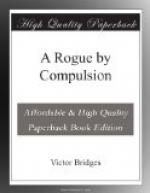“If yer please, sir,” she said, with a sniff, “Mrs. Oldbury wants ter know if yer’ll be likin’ a barf in the mornin’.”
“You can tell Mrs. Oldbury that the answer is yes,” I said gravely. Then I paused. “What’s your name?” I asked.
She sniffed again, and looked at me with round, wondering eyes. “Gertie, sir. Gertie ’Uggins.”
I felt in my pocket and found a couple of half-crowns.
“Take these, Gertie,” I said, “and go and have a damned good dinner the first chance you get.”
She clasped the money in her grubby little hand.
“Thank you, sir,” she murmured awkwardly.
“You needn’t thank me, Gertie,” I said; “it was a purely selfish action. There are some emotions which have to be shared before they can be properly appreciated. My dinner tonight happens to be one of them.”
She shifted from one leg to the other. “Yes, sir,” she said. Then with a little giggle she turned and scuttled out of the room.
I washed and dressed myself slowly, revelling in the sensation of being once more in clean garments of my own. I was determined not to spoil my evening by allowing any bitter or unpleasant thoughts to disturb me until I had dined; after that, I reflected, it would be quite time enough to map out my dealings with George.
Lighting a cigarette I left the house, and set off at a leisurely pace along Edith Terrace. It was my intention to walk to Victoria, and then take a taxi from there to whatever restaurant I decided to dine at. The latter question was not a point to be determined lightly, and as I strolled along I debated pleasantly in my mind the attractions of two or three of my old haunts.
By the time I reached Victoria I had decided in favour of Gaultier’s—if Gaultier’s was still in existence. It was a place that, in my time at all events, had been chiefly frequented by artists and foreigners, but the food, of its kind, was as good there as anywhere in London.
I beckoned to a passing taxi, and waving his arm in response the driver swerved across the street and drew up at the kerb.
“Where to, guv’nor?” he inquired.
I gave him the direction, and then turned to open the door. As I did so I noticed a man standing on the pavement close beside me looking vacantly across the street. For an instant I wondered where I had seen him before; then quite suddenly I remembered. He was the man we had passed in Edith Terrace, lighting a cigarette under the street lamp—the man who had reminded me of one of the prison warders. I knew I was not mistaken because I could see the scar on his face.
With a sudden vague sense of uneasiness I got into the taxi and shut the door. The gentleman on the pavement paid no attention to me at all. He continued to stand there staring aimlessly at the traffic, until we had jerked forward and turned off round the corner of Victoria Street.




